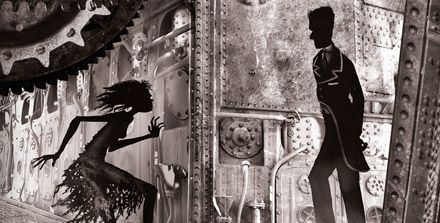Leanne Hall talks to Richard Harland, author of the fantastic ‘steampunk’ fantasy novel Worldshaker which has just been sold to a major US publisher. How could you resist reading a book that Richard himself describes as ‘Charles Dickens on steroids’?
You’ve been a writer for a long time, and had many books published, mostly in the sci-fi and fantasy genre. However
I think it took so long because it was always special. I was determined to get everything absolutely, totally right. The basic world and the bare bones of the story came early and easily, but the characters and their relationships needed many years to grow. Ebnolia Porpentine, Bartrim Gibber, Sephaltina Turbot—they’re all extreme cases but not caricatures. I had to give them time to come alive with their own individual energy.
So I made a start, rewrote, produced a first draft, re-thought and re-wrote from first page to last, then re-thought and re-wrote all over again. It could have been agony, but it wasn’t—because I could feel the characters becoming more real and the world becoming more solid with every re-write.
I’ve never written a book like this before, which went through so many changes for the better. Every improvement I made seemed to bring other improvements in its wake. I think the story knew where it wanted to go all along—it just took 15 years to lead me there!
Could you please describe what ‘steampunk’ is for those who don’t know?
Steampunk? Well, it boils down to the appeal of old-fashioned machinery and gadgets. You know, the sheer poetry of all the tiny cogs inside a clockwork clock, or the glass valves and maze of wires inside a pre-transistor radio. The ‘steam’ part suggests steam-age machinery, the ‘punk’ is mostly an accident (a crossover from ‘cyberpunk’).
Steampunk fiction is neither exactly fantasy nor science fiction: it’s a kind of retro imagining of machinery and gadgets that might have happened. In Worldshaker, the juggernauts are mobile cities as big as mountains, moving on rollers, driven by steam turbines.
Jules Verne in his own day imagined future technology, but nowadays it looks to us like an alternative technology of the past that never actually happened. Steampunk worlds usually have a 19th century or pre-WW I feel about them, like The Golden Compass (aka Northern Lights).
In the U.S., steampunk is a whole way of life. There’s steampunk jewellery, steampunk clothes, steampunk ornaments and artifacts. Definitely an up-and-coming trend!

Anthony Lucas’s front cover illustration
The front cover is awesome! How did film director Anthony Lucas come on board with this?
I love Anthony’s cover! It has the same atmospheric gothic-industrial feel as his Oscar-nominated movie, The Mysterious Geographic Explorations of Jasper Morello. I still don’t know how Allen & Unwin persuaded him—I’d never have dreamed of asking a high-profile movie director to create a book cover! I think they must have given him a really strong impression of Worldshaker, because it’s true, Anthony’s visual imagination and my verbal imagination are a perfect match. When he read the book, I’m glad to say he loved it. (In fact, his Hollywood agent is currently exploring possibilities over there …)
You have a great writing tips section on your website. Do you consider it part of your role as a published author to inspire and help others to write?
Thanks! www.richardharland.net is still the best place to go for all the background on Worldshaker, but the writing tips there are only half of what’s now gone up on a separate website, at www.writingtips.com.au. 145 free pages of tips for writers of fantasy and speculative fiction—and any form of fiction where story matters.
I hope it helps young and aspiring writers. It’s the sort of advice that would have made all the difference to me when I was younger. I wish someone could have sat me down and given me those tips when I needed them!
I took four months off my own fiction writing to produce www.writingtips.com.au. It covers everything I’ve learned over my 15-book career (and a few things I learned in a different way from my 25 years of writer’s block before that). I think of it as paying back some of my own good fortune when my dream of becoming a published writer finally came true.
How are you going on the sequel
The story of the sequel is coming together beautifully. As a natural-born planner, I already have a fat folder full of notes! At the moment, I’m negotiating over revisions for the U.S. with Simon & Schuster—nothing too drastic, but I want to see exactly how the American version looks before I launch into writing the sequel.
I probably shouldn’t give away too much yet. I’ll just say that almost all of the (surviving) characters from Worldshaker re-appear in Liberator; Col’s relationship with Riff runs onto rocky ground; and an extremist faction of the Filthies Revolutionary Council takes control and seeks revenge against the old Upper Decks elite. Oh, and the Prussian, Russian and Austrian juggernauts converge to attack this one anti-imperialist juggernaut—Worldshaker as was, Liberator as now is. Enough!


